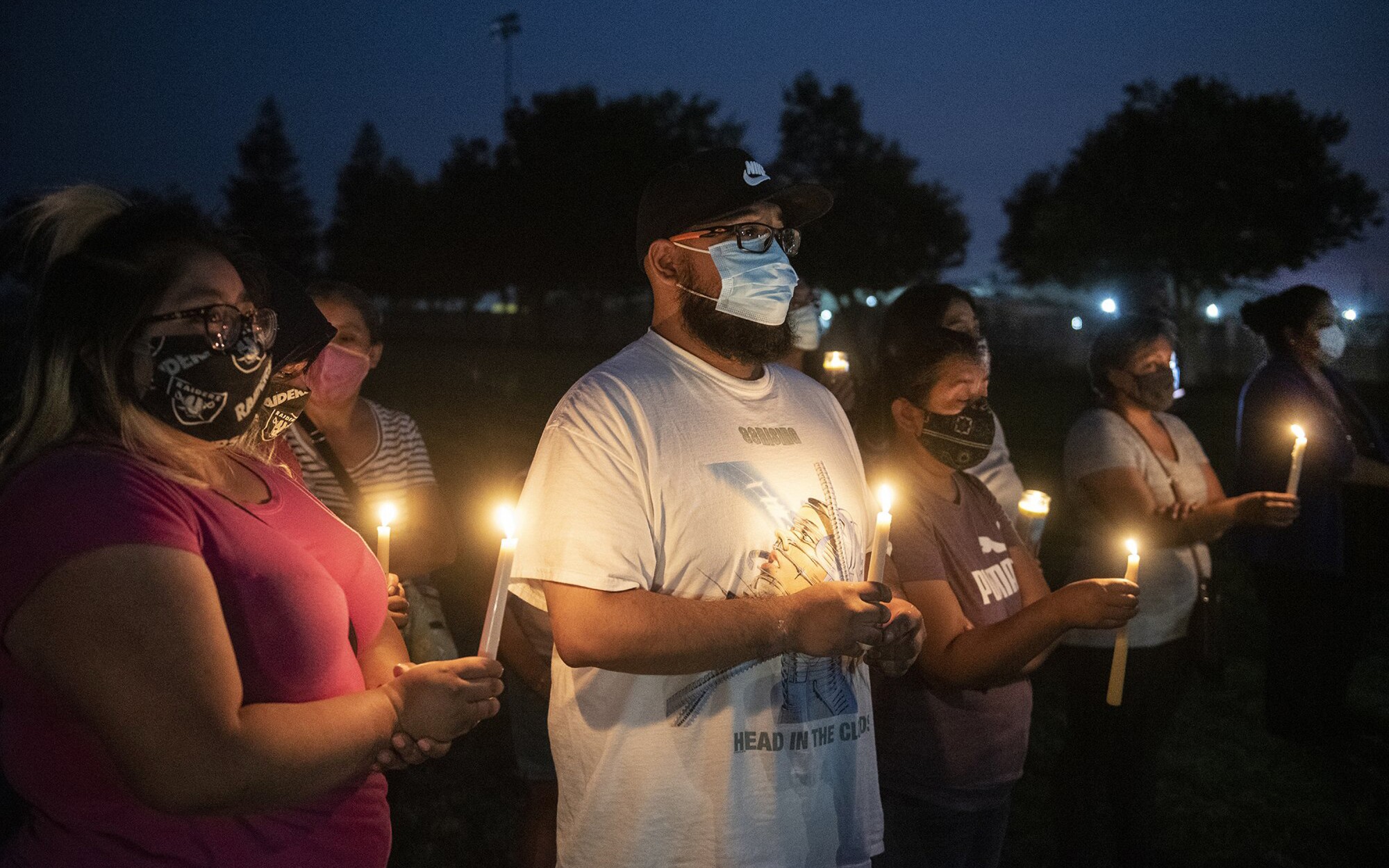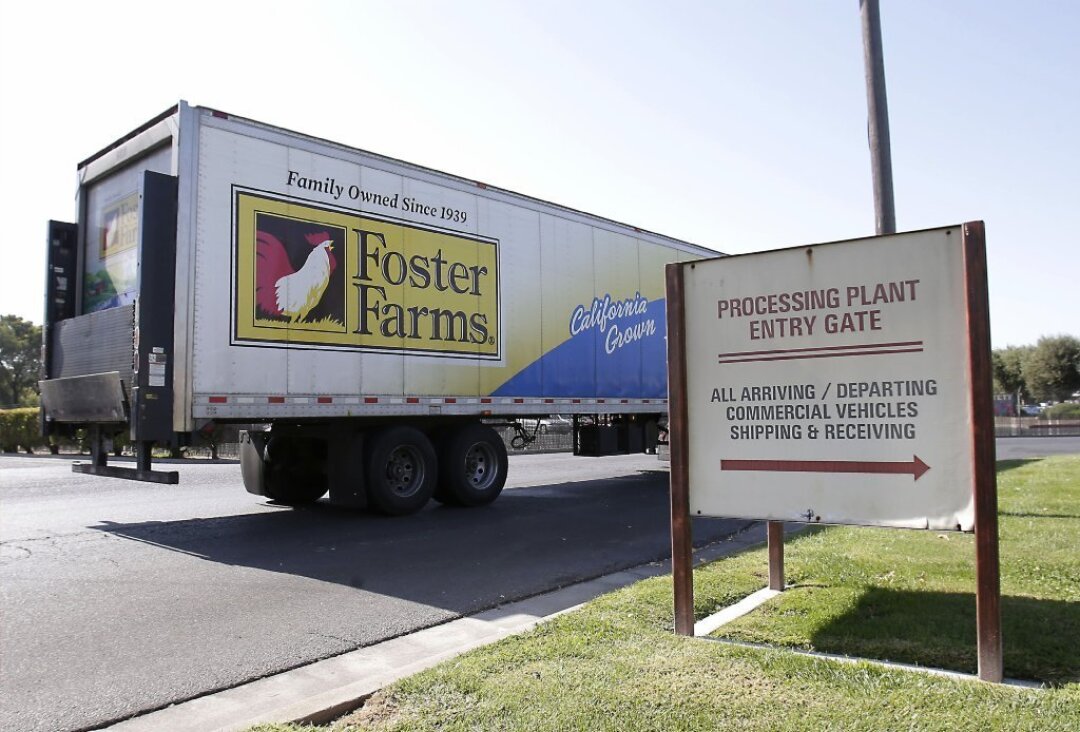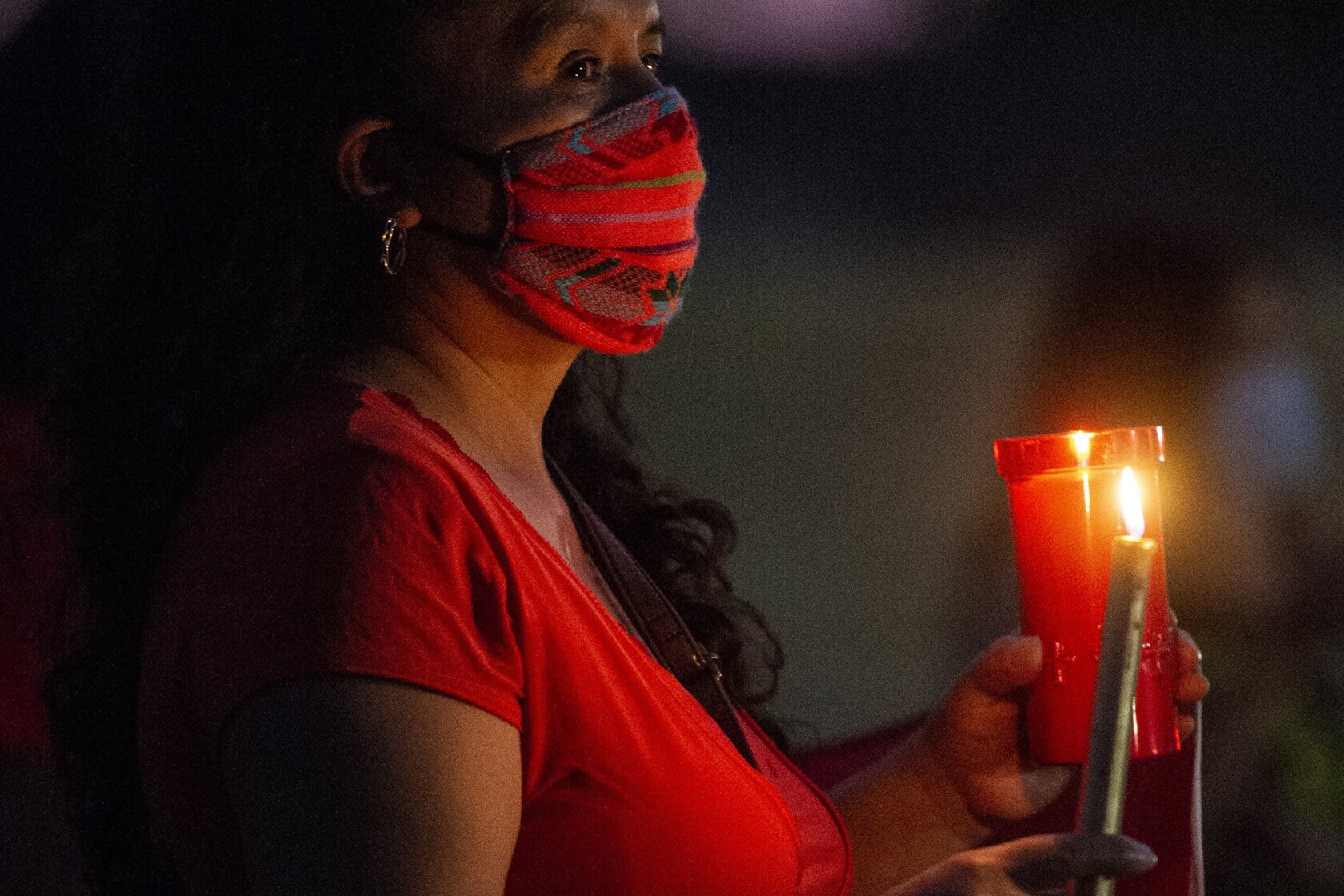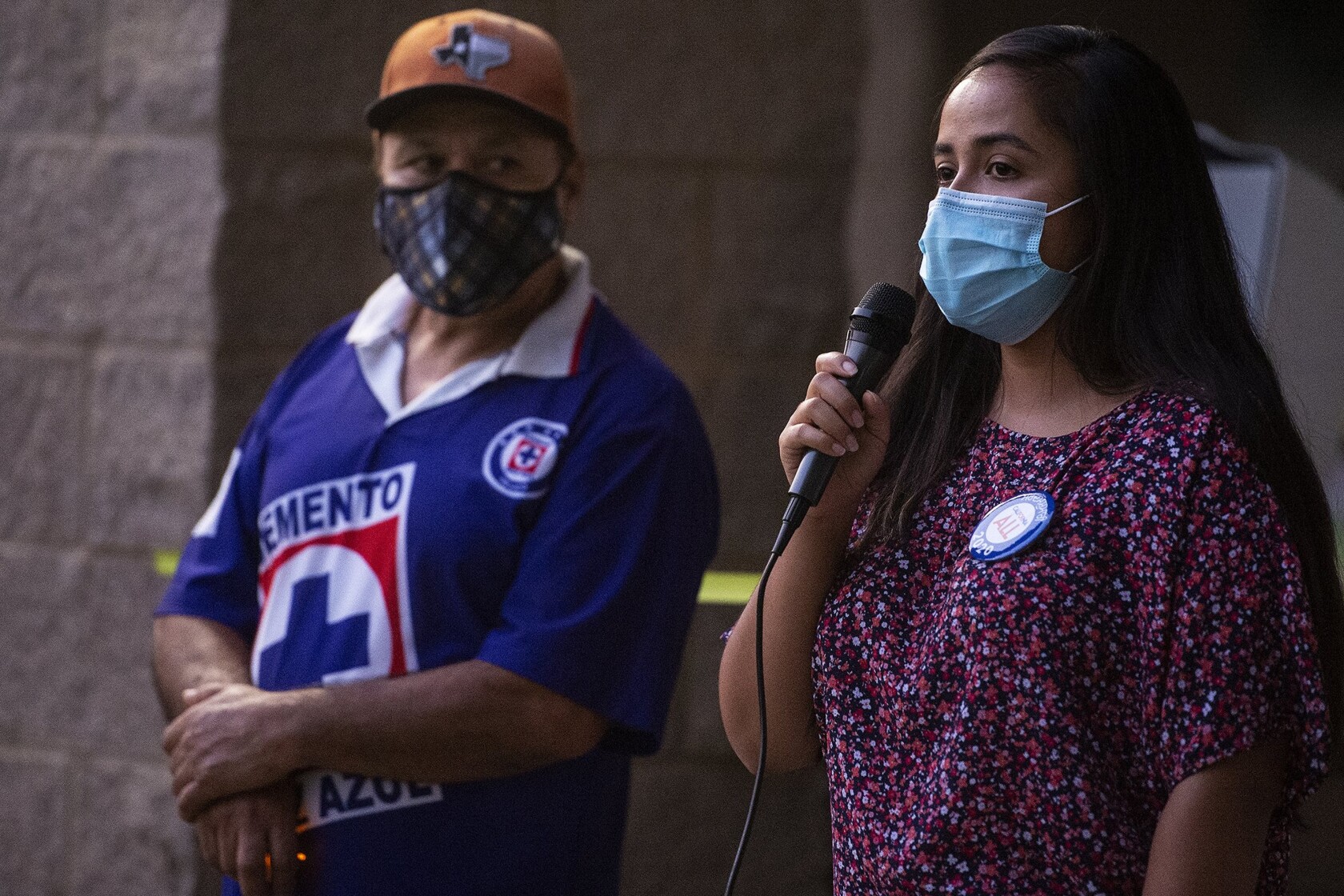Originally Published in the Los Angeles Times
Jie Jenny Zou, Andrea Castillo and Erin B. Logan - September 4, 2020

When Daljit Singh retired in April after 26 years processing chicken carcasses at Foster Farms in Livingston, friends called him “the lucky one.”
He had avoided the crippling injuries of his colleagues: knee replacements, shoulder surgeries, nerve damage that led to “claw hand.”
Working eight-hour shifts, six nights a week, still took a toll on his back, shoulders and legs, said Singh, 68, an Indian immigrant who spoke to The Times through an interpreter.
Supervisors sped up production lines to compensate for having employees out sick, Singh said. Those unable to keep up or put in overtime were penalized under a points system that led to firings.
Then in March, a new threat emerged with the pandemic — and it’s one that even six months later, state officials still don’t have a full picture of, a Times review of documents indicates.
“I feel grateful that I was able to get out before — that I didn’t get coronavirus,” he said. “People are very, very scared.”
Food processing has always been dangerous work. Compared to other sectors, food workers are 9.5 times more likely to die on the job. Injuries are especially high in meatpacking, where an average of two amputations occurs weekly.
The pandemic has only amplified those threats for a workforce largely made up of people of color, immigrants and migrants. Workers not only fear contracting the virus, but getting injured as more employees call out sick, leaving less staff to meet heightened demands for food production.
Since April, more than 53,000 food workers nationwide have tested positive for COVID-19 and over 200 have died, most of them in the meatpacking industry. In Los Angeles County, food processing accounts for the second highest number of infections by workplace, following nursing homes.
Despite the escalating stakes, an examination by The Times found vast inconsistencies in workplace reporting.
Some businesses have been slow to report cases to local officials or test employees. Others with well-publicized outbreaks haven’t filed reports of sick or dead workers to California’s Division of Occupational Safety and Health, known as Cal/OSHA.
Understaffed and overwhelmed, the agency has struggled to manage the crisis with little direction from its federal counterpart, the U.S. Occupational Safety and Health Administration — which has been accused by worker advocates of abandoning its role to ensure safe workplaces.
On Wednesday, the Foster Farms factory where Singh had worked was shut down for deep cleaning after Merced County health officials learned that eight of its employees had died after contracting the virus and another 358 had tested positive.
A Times review of Cal/OSHA data obtained through public records laws shows Foster Farms reported just one COVID-19 death from Jan. 1 through Aug. 13, the most recent data available. A corporate memo dated Aug. 24 said nine employees had died companywide.
Martha Vera, who has worked at the plant for 24 years, is mourning the loss of her husband, a Foster Farms truck driver who died Aug. 14 of complications from COVID-19.
“What does this company really want?” she said through tears. “How many more people do they think should die for them to do something … for the company to protect its workers? How many more? Can someone tell me?”

The plant has been grappling with an outbreak since June, but Cal/OSHA didn’t inspect the facility in person until Aug. 3.
The county’s decision to shutter the plant came weeks after local health officials flagged Foster Farms for repeated testing failures and ordered management to provide employees with face coverings and accurately report COVID-19 related hospitalizations and deaths to Cal/OSHA.
The United Farm Workers of America, which represents workers at the Livingston plant, said union officials have been unable to get answers about exactly how many employees have died and when. “Foster Farms has sought to obscure the number of deaths and the sanctity of each person’s life throughout this crisis,” wrote organizer Elizabeth Strater.
Ira Brill, vice president of communications for Foster Farms, declined to comment on the pending Cal/OSHA investigation, and in a two-page statement to The Times blamed the surge in infections on California’s reopening efforts.
“Foster Farms can protect employees while they are on our premises, and educate them as to protective measures that they should always be taking, but we cannot fully protect them when they are exposed in the county community,” Brill said.
The scope of the Livingston outbreak wasn’t publicly known until the shutdown because Merced County had stopped reporting the total number of worksite infections online sometime in July, citing health privacy concerns.
According to health director Dr. Rebecca Nanyonjo-Kemp, the county still tracks worksite cases but stopped posting the figures publicly because the information was “being used in a negative light” and was “misunderstood.” Concerns from local businesses played a role in the decision, she said, but were not a “driving determinant.”
Nanyonjo-Kemp said working closely with businesses is key to keeping workplaces safe. “We’re not trying to destroy by reputation, or otherwise, how people operate.” She described the Livingston plant as an outlier and said other employers have been following COVID-19 guidelines.
It’s unclear how closely Cal/OSHA is keeping track of workplace outbreaks or coordinating with local health officials. By law, employers are required to immediately report any serious work-related injuries, illnesses and deaths.
Internal emails released in July show officials refining voluntary employer guidelines, but reveal little in the way of enforcement or coordination to deal with an influx of COVID-19-related workplace complaints. State data provided in late August showed wide gaps in employer reports of sick and injured workers.
When Merced County officials first tried to close the plant, Foster Farms invoked President Trump’s executive order deeming meatpacking facilities “critical infrastructure.” Doing so allowed the company a 48-hour stay. Trump’s order, which was driven by industry lobbying and issued in late April, has been derided by unions as justification to keep plants running despite widespread outbreaks.
Foster Farms’ safety problems aren’t limited to its Livingston plant. Separate investigations are underway at the company’s locations in Fresno and Turlock, where a worker died on the job April 27.

Juanita Salazar remembers rushing home after a 10-hour workday to drive her son, Luis, to the turkey plant for his night shift. Though the two lived together, they had barely seen each other during the pandemic.
“Bye, Luis, I love you,” Juanita said as she drove off, blowing him a kiss. Less than two hours later, the 30-year-old stood lifeless, hunched over a conveyor belt with his skull pinned between two metal tracks.
At the time of the accident, Foster Farms was experiencing periodic staffing shortages due to workers out sick or quarantining, according to community leaders.
The family and their attorney have not been able to get in touch with Cal/OSHA, which is still investigating the accident. Official policy requires the agency to contact family members early on in a fatality investigation.
Salazar’s death is among the dozens that happen annually in food processing nationwide. Back in December, Cal/OSHA Chief Doug Parker vowed to take a closer look at California’s uptick in workplace deaths, including Latino workers, who accounted for 43% of the state’s worksite fatalities in 2018.
In an August meeting, Parker said Cal/OSHA had received reports of 122 fatalities and 494 injuries and illnesses related to COVID-19, which he believes is an “undercount.”
The Times found that while some companies provided detailed updates of individual workers stricken with COVID-19, others with well-publicized outbreaks filed no reports to Cal/OSHA — like Smithfield Foods, which operates the Farmer John plant in Vernon.
Cal/OSHA spokesperson Erika Monterroza would not comment on inconsistencies in employer reporting, but said the agency has made recent strides to address outbreaks in food plants, including more inspections.
“We will continue to prioritize these facilities, particularly where there is any evidence of workplace transmission,” she wrote in an email. Monterroza also acknowledged that coordination has been a “challenge” for the agency, requiring communication with “60 different local health officials across the state.”
The agency is now seeking to staff up, following articles by The Times outlining years of vacancies and mismanagement that have left Cal/OSHA understaffed, including bilingual inspectors.
On Friday, the agency issued 11 COVID-19 related citations to employers in food processing, meatpacking, healthcare, agriculture and retail, calling them “the first of many to be issued in the coming weeks and months.” None of the citations involved employers mentioned in this story.
The Livingston plant will be allowed to reopen following Labor Day, but county officials cautioned the closure could be extended if Foster Farms continues to disobey orders.
Calls for a similar shutdown plagued the Farmer John facility.
Emails reviewed by The Times show Smithfield was slow to notify Vernon about positive cases, confirming an outbreak on April 17 only after city officials received a complaint about numerous sick workers. But as the outbreak grew, Vernon officials told Smithfield it would no longer need to report positive cases to the city because of Trump’s executive order.
By the time Cal/OSHA inspected Farmer John on May 27, union officials were urging for a complete shutdown after more than 100 workers were sickened.
A Smithfield worker, who asked for anonymity for fear of retaliation and tested positive for the virus, said they were concerned production line speeds had increased, which could lead to more injuries.
“This is how I eat and pay bills,” the worker said, adding that if it were up to family members, “I wouldn’t be going back to work.”
Smithfield declined to answer questions about its Farmer John plant. In an emailed statement to The Times, the company said it was committed to keeping workers safe and had taken precautions across its sites nationwide, such as slowing down production.
Last month, the Congressional Hispanic Caucus demanded a federal investigation into meatpacking, including the approval of faster line speeds, which has been shown to increase catastrophic injuries. The request followed July’s “Safe Line Speeds in COVID-19 Act,” a bill co-sponsored by Sen. Dianne Feinstein (D-Calif.) that would prevent facilities from speeding up production during the pandemic.
Worker safety advocates have criticized Cal/OSHA for anemic enforcement, pointing to delayed investigations and complaints that go unanswered.
In May, several came out in support of statewide emergency standards that would require employers to take greater precautions against COVID-19. After months of discussion, Cal/OSHA signaled support for the proposed standards.
But an independent board appointed by Gov. Gavin Newsom to oversee policy changes at the agency said the new rules would amount to an unnecessary “additional regulatory burden” — echoing concerns from business groups that have criticized the proposed standards as duplicative.
Instead, the board wrote, Cal/OSHA should focus its “limited resources” on current enforcement and consultation efforts. An official vote on the matter is scheduled for later this month.
In the meantime, workers continue to get sick.
At One World Beef in Imperial Valley, a slaughterhouse just north of the U.S.-Mexico border, at least one worker has died from COVID-19. County officials declined to provide coronavirus infection figures for any food processing sites they oversee, writing in an email in late July that the matter was “currently under investigation.”
George Medina, an organizer with the United Food and Commercial Workers, which represents 1.3 million workers nationwide, said more than 150 workers at the plant have been diagnosed with COVID-19.
A majority of the predominantly Latino workforce lives in Mexicali, Mexico, raising concerns of cross-border transmission.
One World Beef is among many plants that use attendance-based bonuses despite criticism they could encourage sick employees to continue working. During the pandemic, the plant has offered weekly bonuses of $100 and 10 pounds of meat to workers who complete full shifts.
A similar bonus was mentioned in a lawsuit filed last month by Pennsylvania meatpacking workers against federal OSHA, claiming the agency has ignored their safety concerns.
One World Beef did not respond to multiple requests for comment.
A worker who requested anonymity out of fear of retaliation said many who have experienced COVID-19 symptoms have stayed silent to keep working. “I scolded them,” he said. “It’s for your health, for mine and for everyone’s. But they worry about their income too.”
Times staff writer Rong-Gong Lin II in San Francisco contributed to this report.




Leave a Reply